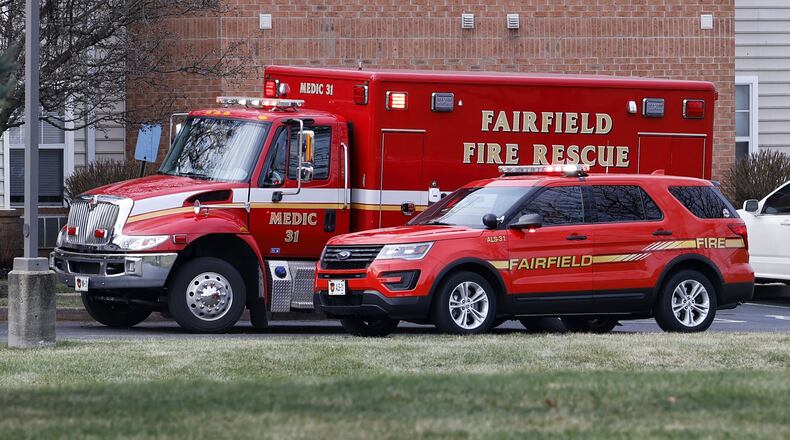Fairfield property owners pay a collective 7.15 mils on the two continuing fire levies, one approved in 2000 and one approved in 2016. This new levy would eliminate those existing levies and replace them with the one continuing levy. The 9.25-mil levy expected to be on the May 3 ballot would cost the owner of a $150,000 home $485.63, which is $195.63 more than they pay now. City Council members say this equates to about 50 cents a day.
Councilman Tim Meyers called supplementing the fire department’s operations with overtime “unsustainable” and said the levy is “needed” and “is the right thing to do.”
“Emergency runs ― fire and so forth ― are part of that quality of life that we have to guarantee our residents, that we have to make sure that they are there every single time,” he said.
Over the past decade, the fire department has been a “revolving door” for part-time firefighters leaving for full-time jobs, said Fire Chief Don Bennett. The levy will help the department transition from a combination department ― where nearly half of each shift is staffed with part-timers ― to a career department, where all firefighters are full-time hires.
The chief said if the city makes the change to a career department without the assistance of the replacement levy, and instead supplements the fire department funding from the general fund, it would be “catastrophic.”
“The reality of 29,000 hours of overtime (in a year) in a department of this size, and $1.4 million (paid); it’s an interest-only loan,” he said. “We’re not doing anything to build equity or longevity in this department, not to mention, we have probably 11 people that are approaching retirement, which will easily take 25 to 30 years of experience in each case out the door.”
Bennett said by 2029, the general fund is forecast to be $2.8 million in the hole, depleting the city’s required rainy day fund and putting its Aa1 bond rating (the second-best possible rating) at risk.
Fairfield Finance Director Jake Burton added that supplementing the fire department would also reduce funding for other high-priority items, such as the police department, capital projects, street improvements and economic development.
The levy would raise $11.24 million annually to help convert the 36 part-time positions into 18 full-time ones. The plan is to hire six full-time firefighters by early 2023 and then hire three full-time firefighters a year in each of the ensuing four years. Bennett hopes the city will eventually be approved for a new federal Staffing for Adequate Fire and Emergency Response grant, which would 100% fund a designated number of new firefighters hired for three years. The city was rejected in 2021 after City Council turned down the grant in 2019.
The city will need to keep a close eye on projections and forecasts as Burton said, “Six years is the minimum amount of time the new levy would fund the fire department without any additional revenue streams or general fund supplement being necessary.”
But fire officials say this step is necessary to maintain experience at the department. Since January 2019, 78 part-time firefighters have left the city. Nearly 77.9% of those former staffers left for a full-time fire service job, and 19.5% left for a full-time, private-sector job.
That “revolving door” has also meant the experience level has declined, the chief said.
In September 2015, 25 of 48 part-time personnel had more than two years fire service experience. Five years later, it was just 14 of 48. As of this month, only nine of 36 part-time personnel have more than two years experience.
The new issue is part-time vacancies can’t fill because there are too many full-time openings around the region.
“We have eight part-time openings with no applications on file,” Bennett said.
The Cincinnati Fire Department has 120 full-time openings, and the City of Columbus has 200. In Butler County, Hamilton, Fairfield Twp., Ross Twp., West Chester Twp., and Liberty Twp. are all looking for full-time firefighters.
Fairfield resident Steve Barrett, of Parliament Court, said he doesn’t disagree with the need to provide more funding for the department, but emphasized, “the thing I do disagree with is the method of funding this need.”
“It’s not going to make me miss a meal paying more money on my property tax, but it’s just peck, peck, peck, peck, peck,” he said. “Nobody’s going to miss 50 cents (a day), I guess, but it’s the principle to me. ... Government always wants to tax me.”
He questioned if the council had debated other ways to fix the fire department’s funding before pursuing a levy. City Council has been discussing the issue of fire department staffing, and its finances for the past three years.
Councilman Matt Davidson, who is less than a month into his four-year term, said he’s “comfortable” pursuing the levy after multiple meetings and presentations, answering all question he, and residents who’ve approached him, had of the city staff. He said the levy was not the city’s first, or even second, option.
“I’ve seen over and over where we’ve made those cuts, we’ve made those sacrifices, and we have looked at other ways to do this. I know we’ve done everything we can and this is what we have to do.”
The issue has been sent to the Butler County Board of Elections to be considered for certification for the May primary ballot.
About the Author

